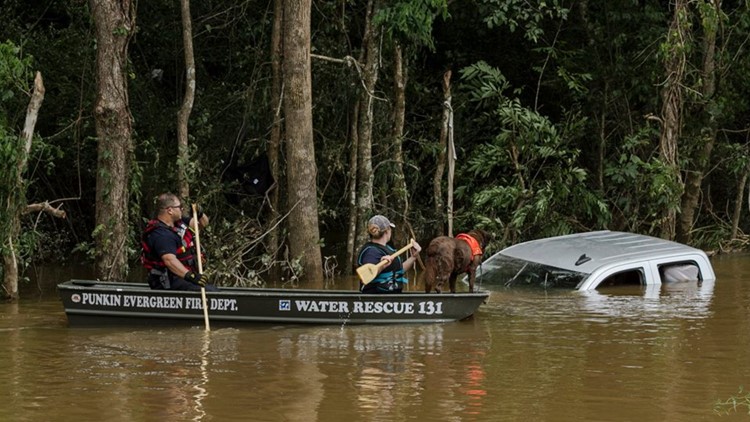Federal funding has long been a point of contention following natural disasters. And, a 2018 study isn't doing much to quell critics' concerns.
The long-term study of federal dollars being applied to natural disasters claims aid has been disproportionately given to wealthier communities over their less wealthy counterparts.
Sociologists Junia Howell and James Elliott published the study, which found that as damage from natural disasters increased, so did the amount of federal aid based on economic status.
"Results indicate that as local hazard damages increase, so does wealth inequality, especially along lines of race, education, and homeownership," the study said.
Same hurricane, different impacts
In an investigation published Tuesday, National Public Radio looked at two separate Houston families and how each had been disproportionately provided money by the federal government following Hurricane Harvey based on their economic status.
NPR reported that one family with relatively higher income was given $30,000 by the Federal Emergency Management Agency for their home and provided more than $100,000 in refunded taxes, along with being approved for a low-interest loan by the Small Business Administration. The family has since become financially stable.
Another family with a single mom and three kids, was not so lucky, reports NPR. The family stayed with a coworker of the mom and was given $2,500 for a rental deposit. The mom says she was forced to spend it on a new vehicle for the family members, who now lived 45 minutes away from work and school. FEMA was upset that she spent it in an 'unintended' way, and she did not qualify for other sources of federal aid, a significant tax refund, or a low-interest loan due to her credit score, according to NPR.
The FEMA process
The application process for FEMA federal assistance is available through several channels and languages. FEMA assistance can be requested online or over the phone, with a special hotline dedicated to the hearing-impaired.
The website lists a PDF with all the information needed to apply for the aid and includes the following note: "Disaster recovery assistance is available without regard to race, color, gender, religion, national origin, age, disability, English proficiency or economic status."
"During review, as part of the EHP (Environmental Historic Planning and Preservation) review process, some projects are looked at for environmental justice. Environmental justice ensures the fair treatment and meaningful involvement of all people regardless of race, color, national origin, or income," FEMA told 10News in a statement.
Some people familiar with the process would disagree, however.
Kathy Payton, the director of a Houston nonprofit working to redevelop the community, told NPR that the 'rigid application requirements' make it more difficult for less wealthy families.
"You've got to make adjustments based on the vulnerabilities and the needs of the families," Payton said. "And that's not what we do."
FEMA offers voluntary buyout programs to help victims of repeated flooding move to safer locations, but NPR claims those buyouts have been disproportionately offered to whiter, higher-income neighborhoods.
"Hardworking Americans who are working class are going to find their communities stressed even more than they are now," Andrew Light, an editor of the 2018 National Climate Assessment told NPR. "If you're already a community at risk, you're going to be at more risk."
In other words, researchers and NPR are saying it has become more difficult for Americans with lower incomes to stay afloat following a natural disaster, while the federal aid process has allowed for wealthier Americans to regain a sense of normalcy sooner.
But, FEMA disagrees with that assertion. A FEMA spokesperson provided the following statement in response to the study and NPR investigation:
"The analysis used in today’s NPR stories does not paint a full, accurate picture of FEMA’s buyout process.
FEMA does not choose which properties participate in buyouts or acquisitions. Each state (grantee) works with their local governments to determine communities and residents who are interested in taking part of buyouts of repetitive loss properties. All of the FEMA Hazard Mitigation Assistance grants programs are voluntary.
All properties/homeowners who participate in acquisitions must be repetitive loss properties. No demographic data is collected as part of the grant process.
Acquisitions save taxpayers dollars because the NFIP is no longer paying repetitive flood claims on those properties.
Each county floodplain manager and local officials know best the needs of their communities. We trust and support local and state officials during the buyouts process."
What other people are reading right now:
- 2 more blood pressure drug recalls for cancer risk; 4 in one week
- A ‘child of God’: 4th grader among Alabama tornado victims
- Multiple-car crash on Skyway Bridge causes major delays into St. Petersburg
- Bibles survive massive church fire: 'Though odds were against us, God was not'
- Nearly nude Florida man rides bike backward on Miami interstate
►Make it easy to keep up-to-date with more stories like this. Download the 10 News app now.
Have a news tip? Email tips@wtsp.com, visit our Facebook page or Twitter feed.



